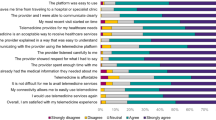Abstract
Interest has developed in the use of mental health consumers as staff members in community programs for persons with serious mental illness. The present study investigates consumer service delivery in a mobile assessment program designed to assist homeless people with severe psychiatric disorders. Consumer and non-consumer staff were generally comparable. Results suggest that consumer staff engaged in more street outreach and were less often dispatched for emergencies. There was a trend for consumer staff to be more likely to certify their clients for psychiatric hospitalization. In sum, consumer staff appear to provide a valuable contribution to this form of service delivery.
Similar content being viewed by others
References
Atkisson, C, Cook, J, Karno, M, Lehman, A, McGlashan, TH, Meltzer, HY, O'Connor, M, Richardson, D, Rosenblatt, A, Wells, K, Williams, J, #ohmann, A (1992). Clinical services research.Schizophrenia Bulletin, 18, 561–626.
Bond, GR, Witheredge, TF, Wasmer, D. (1989). A comparison of two crisis housing alternatives to psychiatric hospitalization.Hospital & Community Psychiatry, 40, 177–183.
Chamberlin, J (1984). Speaking for ourselves: An overview of the ex-psychiatric inmates' movement.Psychosocial Rehabilitation Journal, 8, 56–63.
Chamberlin, J, Rogers, JA, Sneed, CS (1989). Consumers, families, and community support systems. Special Issues: The Community Support System concept.Psychosocial Rehabilitation Journal, 12, 93–106.
Galanter, M (1988)) Zealous self-help groups as adjuncts to psychiatric treatment: A study of Recovery, Inc.American Journal of Psychiatry, 145, 1248–1253.
Levine, IS, Kennedy, C (1985). The homeless mentally ill: A consultation challenge.Consultation: An International Journal, 4, 52–63.
Nikkel, R, Smith, G, & Edwards, DA (1992). Consumer operated case management project.Hospital & Community Psychiatry, 43, 577–579.
Putnam, JF, Cohen, NL, Sullivan, AM (1986). Innovative outreach services for the homeless mentally ill.International Journal of Mental Health, 14, 112–124.
Segal, S, Baumohl, J, Johnson, E (1977). Falling through the cracks: Mental disorders and social margin in a young vagrant population.Social Problems, 24, 387–400.
Sherman, PS, Porter, R (1991). Mental health consumers as case management aides.Hospital & Community Psychiatry, 42, 494–498.
Slagg, NB, Lyons, JS, Cook, JA, Wasmer, DJ, Witheredge, TF. a mobile urban crisis service for the homeless.Hospital & Community Psychiatry (in press).
Solomon, P, & Draine, J (1995a). One year outcome of a randomized trial of consumer case managers.Evaluation and Program Planning 18(2), 117–127.
Solomon, P, & Draine, J (1995b). The efficacy of a consumer case management team: two year outcomes of a randomized trial.Journal of Mental Health Administration, 22(2), 135–146.
Stroul, B. (1988).Community support systems for persons with long-term mental illness, Rockville, MD, National Institute of Mental Health, Community Support Program.
Author information
Authors and Affiliations
Additional information
The contents of this paper were developed under a grant from the National Institute of Disability and Rehabilitation Research, Department of Education cooperative agreement number H133B00011, and the Center for Mental Health Services, Substance Abuse and Mental Health Services Administration. The content does not necessarily reflect the views of the Institutes and does not imply endorsement by the U.S. government. The authors would like to thank Jon Gershon, Travis Seymour, Randy Osuna, and Amy Nelson for their contributions to this research.
All the authors are affiliated with the Mental Health Services and Policy Program, Northwestern University Medical School, except for Judith Cook, who is the Director of the National Research and Training Center on Psychiatric Disability at the University of Illinois at Chicago.
Rights and permissions
About this article
Cite this article
Lyons, J.S., Cook, J.A., Ruth, A.R. et al. Service delivery using consumer staff in a mobile crisis assessment program. Community Ment Health J 32, 33–40 (1996). https://doi.org/10.1007/BF02249365
Issue Date:
DOI: https://doi.org/10.1007/BF02249365




